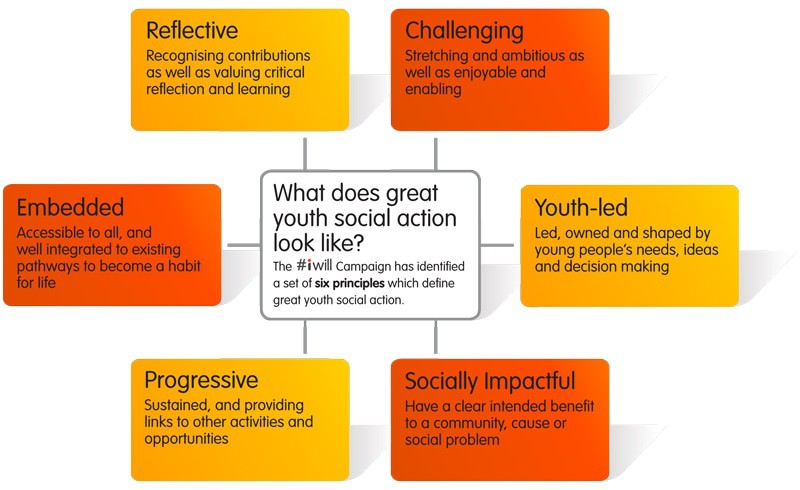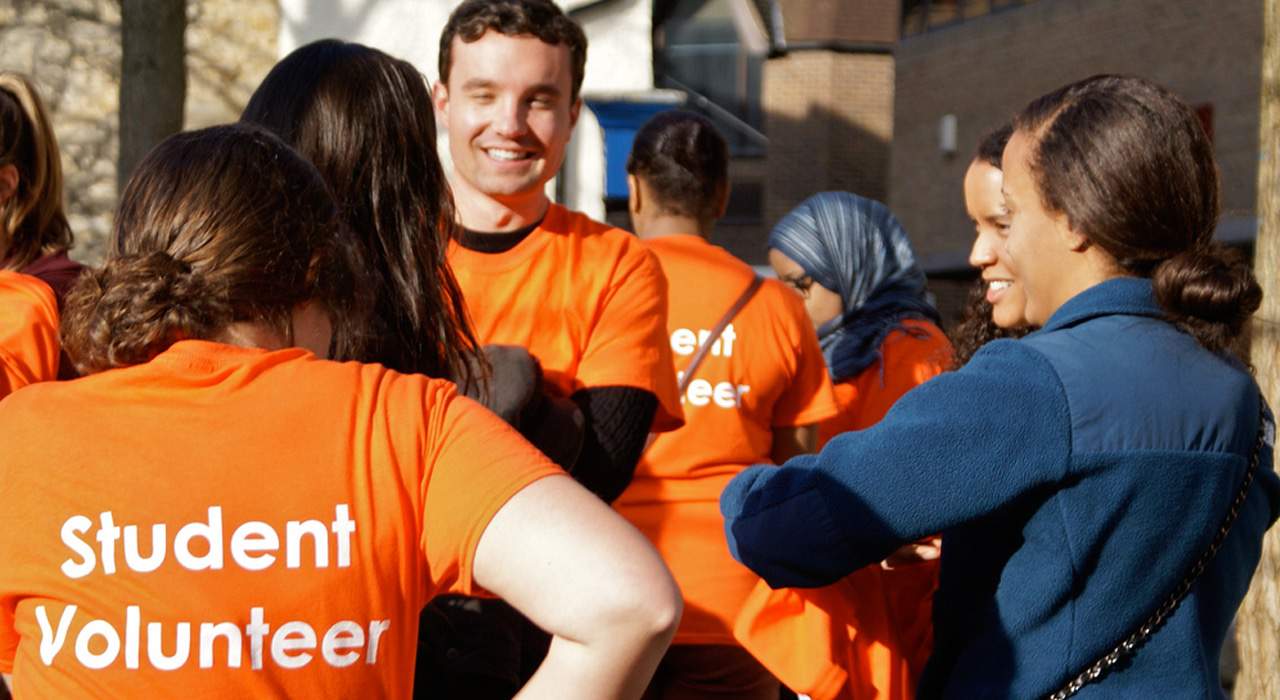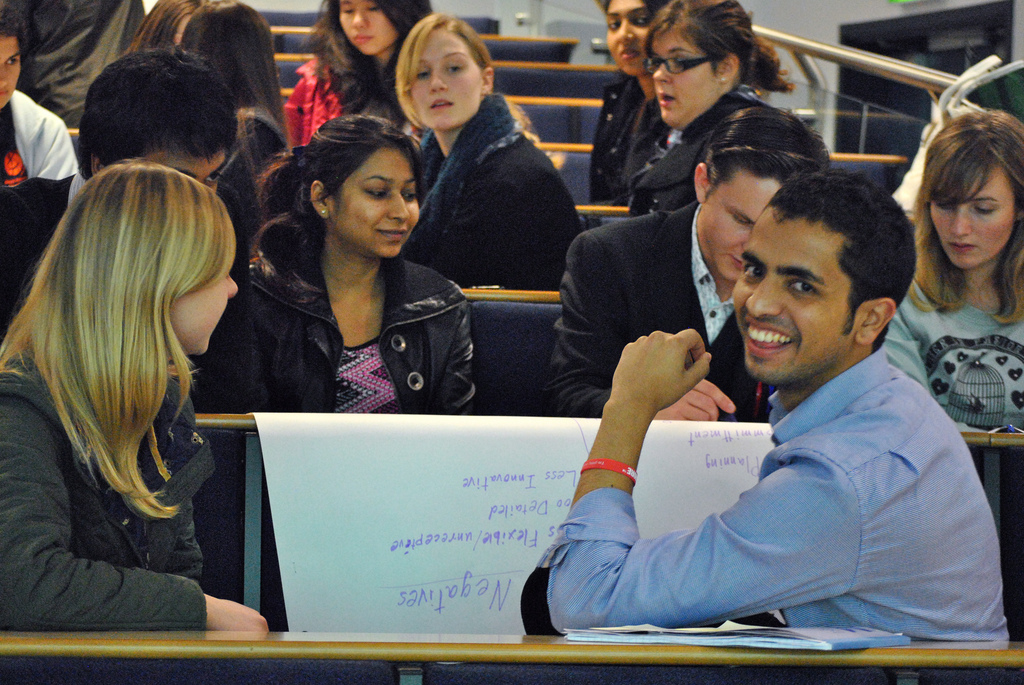We’re still following the #iwill six quality principles across our programmes from Schools Plus to Engage for Change to Service Learning. Find out more about what we do at Student Hubs engaging university students with youth social action. (Editor’s note: 10/02/22)
A key goal of Step Up To Serve’s #iwill campaign is to establish a common impact measurement framework for youth social action. With social action taking place in myriad contexts and for seemingly infinite causes, it can seem nigh on impossible to identify what makes it ‘great’. The six quality principles explored here underpin high quality, meaningful youth social action – focussing on the double benefit model which creates positive impact for both the volunteer and the project, community or individual with whom they are working. This is how we live the #iwill six quality principles.
(Source: www.iwill.org.uk/about-us/principles)
Challenging
We want our opportunities to be enjoyable to students, but we also want them to engage them in crucial social and environmental issues. For us, students volunteering for an hour a week is great; but behaviour change can only happen when they think beyond hour-counting to the wider problem – challenging assumptions about the people, communities and issues at hand. We put a great deal of emphasis on ensuring our volunteering projects include elements of education, critically engaging students with community issues. We also support students to run conferences and events on a whole range of engaging and relevant issues, notably climate change and international development.
We facilitate this by ensuring that each of our programmes are developed with critical engagement at their core. Students engage with an issue and learn the need for their volunteering before they even begin. Our staff also give students leadership roles, giving them a great deal of responsibility and thus challenging them to drive their own involvement forward – this could range from leading the organisation of a conference to managing a committee of volunteers.
We also provide a wide range of training – notably at biannual ‘Hubathons’, where all student committees come together for a weekend of training; and through our recently developed 2 day Challenge Leadership course. We also provide a wide range of training aimed at engaging students in social and environmental issues as a core part of all of our programmes.
Youth Led
Having been founded by a group of students seven years ago, student leadership is extremely important to us as an organisation and is at the heart of all of our activities. We are driven by the passion and innovation of student committees, project coordinators and volunteers across the organisation. Our staffing structure is designed to support student committees who run all of their own activities on the ground.
Our staff are provided with a wide range of training and guidance on how best to empower and support student leaders from the central Student Hubs team.
As previously mentioned we run biannual training weekends for all student committee members. We also run specific training for student coordinators, and a wide range of training on leadership for students.
Socially Impactful
We put a great deal of emphasis on the importance of creating social impact across all of our programmes. All of our activities are directed towards creating social impact and engaging students with the importance of impact, too. We use a Balanced Scorecard and the Salesforce CRM system to track our impact statistics over an annual year, reviewing our progress monthly. This includes measures that correspond with our four key outcomes – more students, doing more, more effectively, for longer – covering the double benefit of community impact and impact on students themselves.
We provide training to all staff, suppoting them to measure social impact in their Hubs. We also provide training and ongoing support to students running community projects to help them measure the social impact of their own projects. All of this work is supported by the central Impact Team at Student Hubs.
Progressive
We map the student social action journey of engagement with the Hub, from signing up to a newsletter, to joining a committee, leading a project or committee and perhaps eventually joining our graduate scheme. We understand that different students require different things at each stage of engagement and we therefore try to provide a wide variety of opportunities to get involved – from one off events or volunteering, to deeper engagement through longer-term volunteering or taking on positions on a committee.
Our staff members based locally are able to recognise students at different stages of engagement and provide the holistic, one-to-one support, that enables students to progress along their social action journey: during university and beyond.
Embedded
All of our work is driven by our mission to mainstream social action in UK universities. Students should come to university and consider volunteering in their community, campaigning for a cause they care about or setting up a social enterprise as much a part of being a student as sport, drama or going out.
In the Universities we work in, we see it as crucial that our activities are fully embedded in the University environment. We therefore work closely with students unions, outreach departments and careers services to ensure our work is fully embedded in the lives of students on campus. We also have offices or desks at the heart of Universities, ensuring that social action is at the centrepoint of students lives.
Reflective
Reflecting on social action is really important to us as an organisation. Through various projects and programmes, we ask students to reflect on what they’ve learnt – both about social issues, and about themselves – in particular, what skills they’ve developed through volunteering. Furthermore, we run the Social Leadership Award across the Student Hubs network, recognising outstanding social leaders who are going the extra mile in their social action. They are required to complete reflection pieces on a range of different social action activities to demonstrate their learnings.



